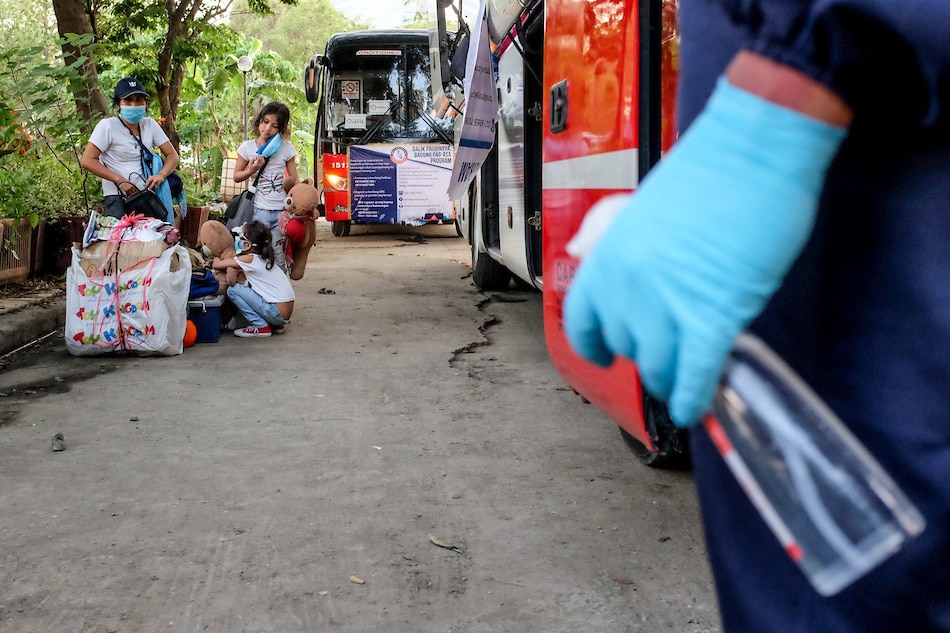'Balik Probinsya' suspended as gov't focuses on stranded individuals | ABS-CBN

Welcome, Kapamilya! We use cookies to improve your browsing experience. Continuing to use this site means you agree to our use of cookies. Tell me more!
'Balik Probinsya' suspended as gov't focuses on stranded individuals
'Balik Probinsya' suspended as gov't focuses on stranded individuals
Arianne Merez,
ABS-CBN News
Published Jun 11, 2020 12:26 PM PHT
|
Updated Jun 11, 2020 05:58 PM PHT
MANILA (UPDATE) - "Balik Probinsya," President Rodrigo Duterte's push for Metro Manila workers to return to their home provinces, is suspended to give way to the homecoming of those who are stranded in the capital region, the official in charge of the program said Thursday.
MANILA (UPDATE) - "Balik Probinsya," President Rodrigo Duterte's push for Metro Manila workers to return to their home provinces, is suspended to give way to the homecoming of those who are stranded in the capital region, the official in charge of the program said Thursday.
For the meantime, resources will be focused on bringing home to the countryside overseas Filipino workers, construction workers, tourists, and students, said "Balik Probinsya" Executive Director Marcelino Escalada Jr.
For the meantime, resources will be focused on bringing home to the countryside overseas Filipino workers, construction workers, tourists, and students, said "Balik Probinsya" Executive Director Marcelino Escalada Jr.
"I decided as a matter of strategy na i-suspend muna ang ating rollouts for the Balik Probinsya to prioritize stranded OFWs, construction workers, students, and tourists," said Escalada, who is also general manager of the National Housing Authority.
"I decided as a matter of strategy na i-suspend muna ang ating rollouts for the Balik Probinsya to prioritize stranded OFWs, construction workers, students, and tourists," said Escalada, who is also general manager of the National Housing Authority.
"We want to make sure that on one hand, the LGUs (local government units) are ready to receive their own constituents by then," he said.
"We want to make sure that on one hand, the LGUs (local government units) are ready to receive their own constituents by then," he said.
ADVERTISEMENT
The indefinite suspension came less than a month into the "Balik Probinsya" program, which aims to bring back to home provinces those who traveled to Manila but ended up living as informal settlers.
The indefinite suspension came less than a month into the "Balik Probinsya" program, which aims to bring back to home provinces those who traveled to Manila but ended up living as informal settlers.
It has so far brought home to Leyte some 100 people. A fresh batch of applicants of the program was supposed to be transported on Thursday.
It has so far brought home to Leyte some 100 people. A fresh batch of applicants of the program was supposed to be transported on Thursday.
A pet project of Sen. Christopher "Bong" Go, Duterte adopted "Balik Probinsya" to ease crowding in Metro Manila, which was highlighted by the coronavirus pandemic.
A pet project of Sen. Christopher "Bong" Go, Duterte adopted "Balik Probinsya" to ease crowding in Metro Manila, which was highlighted by the coronavirus pandemic.
The program has been criticized for lack of coordination with local government units that would receive the returning individuals in light of varying quarantine restrictions.
The program has been criticized for lack of coordination with local government units that would receive the returning individuals in light of varying quarantine restrictions.
At least two beneficiaries of the program also tested positive for COVID-19 upon returning to their hometown.
At least two beneficiaries of the program also tested positive for COVID-19 upon returning to their hometown.
Read More:
Balik Probinsya
Bong Go
Marcelino Escalada Jr
Balik Probinsysa suspended
economy
coronavirus
COVID-19
coronavirus updates
COVID-19 updates
coronavirus latest
ADVERTISEMENT
ADVERTISEMENT


